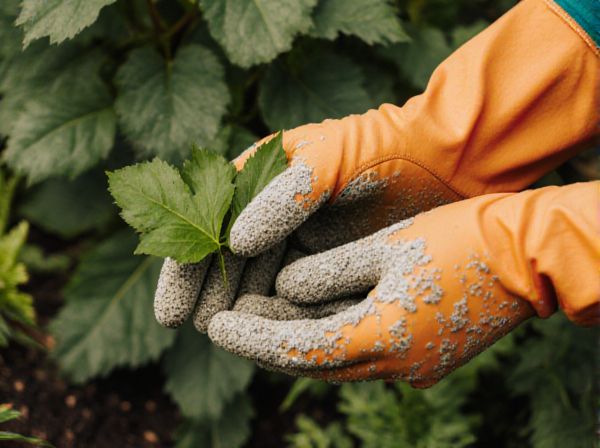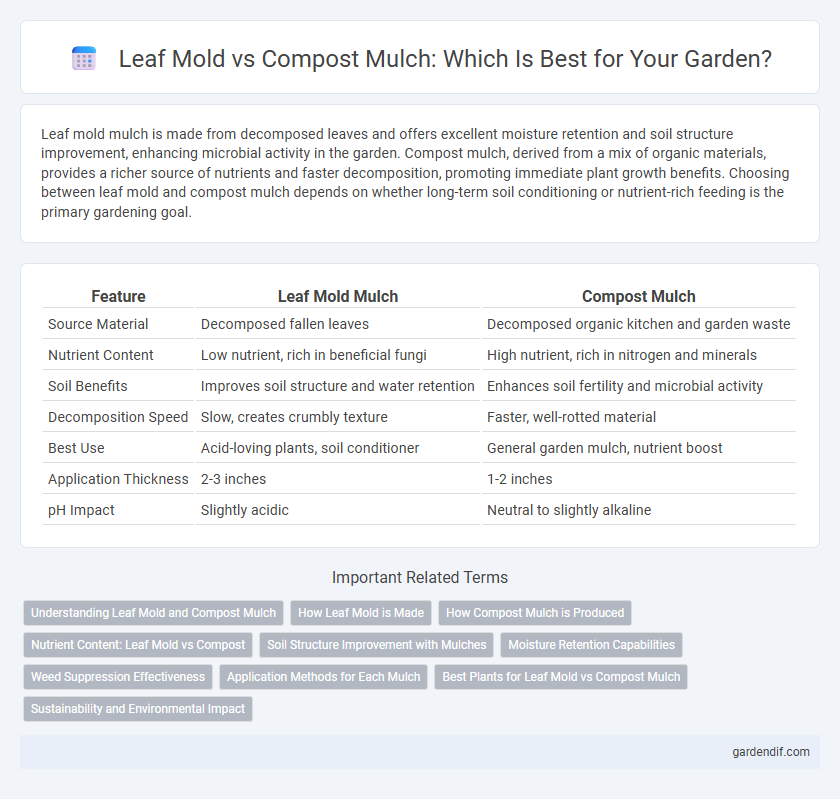
Leaf mold vs compost mulch Illustration
Leaf mold mulch is made from decomposed leaves and offers excellent moisture retention and soil structure improvement, enhancing microbial activity in the garden. Compost mulch, derived from a mix of organic materials, provides a richer source of nutrients and faster decomposition, promoting immediate plant growth benefits. Choosing between leaf mold and compost mulch depends on whether long-term soil conditioning or nutrient-rich feeding is the primary gardening goal.
Table of Comparison
| Feature | Leaf Mold Mulch | Compost Mulch |
|---|---|---|
| Source Material | Decomposed fallen leaves | Decomposed organic kitchen and garden waste |
| Nutrient Content | Low nutrient, rich in beneficial fungi | High nutrient, rich in nitrogen and minerals |
| Soil Benefits | Improves soil structure and water retention | Enhances soil fertility and microbial activity |
| Decomposition Speed | Slow, creates crumbly texture | Faster, well-rotted material |
| Best Use | Acid-loving plants, soil conditioner | General garden mulch, nutrient boost |
| Application Thickness | 2-3 inches | 1-2 inches |
| pH Impact | Slightly acidic | Neutral to slightly alkaline |
Understanding Leaf Mold and Compost Mulch
Leaf mold is a type of mulch created from decomposed leaves, rich in fungal activity that enhances soil structure and moisture retention. Compost mulch derives from a mixture of organic waste, including food scraps and yard debris, providing a nutrient-dense layer that improves soil fertility. Both leaf mold and compost mulch contribute to soil health but differ in nutrient content and decomposition processes, with leaf mold primarily boosting soil texture and compost mulch enriching nutrient availability.
How Leaf Mold is Made
Leaf mold is made by collecting fallen leaves and allowing them to decompose slowly through microbial activity over a period of one to two years, resulting in a crumbly, dark, and nutrient-rich soil amendment. Unlike compost mulch, leaf mold primarily relies on fungi for decomposition, producing a product high in beneficial organic matter and excellent for improving soil structure and moisture retention. This natural process requires minimal turning and no added heat, making it an eco-friendly and low-maintenance method of creating mulch.
How Compost Mulch is Produced
Compost mulch is produced through the controlled decomposition of organic materials such as kitchen scraps, garden waste, and manure, facilitated by microorganisms under aerobic conditions. This process results in nutrient-rich, stabilized humus that enhances soil structure, moisture retention, and fertility when applied as mulch. Unlike leaf mold, which primarily consists of decomposed leaves, compost mulch contains a broader range of organic matter, providing a more balanced nutrient profile for plant growth.
Nutrient Content: Leaf Mold vs Compost
Leaf mold is rich in beneficial fungi and provides a slow-release source of nutrients, primarily enhancing soil structure and moisture retention. Compost mulch contains a broader spectrum of nutrients, including nitrogen, phosphorus, and potassium, making it more effective for immediate nutrient supplementation. Both improve soil fertility, but compost delivers a more balanced and readily available nutrient profile compared to the more specialized benefits of leaf mold.
Soil Structure Improvement with Mulches
Leaf mold enhances soil structure by increasing organic matter and moisture retention, promoting beneficial microbial activity and improving soil aeration. Compost mulch provides a balanced nutrient profile while supporting soil aggregation and water-holding capacity. Both mulches contribute to long-term soil fertility, but leaf mold excels in creating a loose, crumbly texture ideal for root development.
Moisture Retention Capabilities
Leaf mold excels in moisture retention due to its high organic matter content and fine texture, allowing it to hold water efficiently and release it slowly to plants. Compost mulch, while also effective, typically contains a mix of decomposed materials that provide moderate moisture retention but may dry out faster than leaf mold. Gardens using leaf mold benefit from reduced irrigation needs and improved soil hydration compared to those relying solely on compost mulch.
Weed Suppression Effectiveness
Leaf mold offers moderate weed suppression by creating a dense, moisture-retentive layer that inhibits seedling germination. Compost mulch provides superior weed control due to its thicker application and nutrient richness, which promotes rapid plant growth that outcompetes weeds. Both mulches improve soil structure, but compost's more robust barrier effectively reduces weed proliferation in garden beds.
Application Methods for Each Mulch
Leaf mold mulch is best applied as a thin layer around plants, where its moisture retention and slow nutrient release improve soil structure without overwhelming young roots. Compost mulch benefits from being spread thicker, often 2-3 inches, to effectively suppress weeds and provide rich, readily available nutrients for rapid plant growth. Both mulches require reapplication as they decompose, with leaf mold integrating more gradually and compost mulch breaking down faster in garden beds.
Best Plants for Leaf Mold vs Compost Mulch
Leaf mold, rich in decomposed leaves, is ideal for acid-loving plants such as azaleas, rhododendrons, and blueberries, enhancing soil moisture and acidity. Compost mulch, with its balanced nutrients, supports a broad range of vegetables, herbs, and flowering plants like tomatoes, basil, and marigolds by improving soil fertility and structure. Selecting leaf mold for acidophilic plants and compost mulch for nutrient-demanding crops optimizes plant health and growth.
Sustainability and Environmental Impact
Leaf mold mulch enhances soil structure and moisture retention by slowly decomposing, promoting biodiversity and reducing landfill waste, which supports sustainable gardening practices. Compost mulch, rich in nutrients, accelerates organic matter recycling and minimizes synthetic fertilizer use, lowering greenhouse gas emissions. Both mulches contribute to carbon sequestration and reduce the environmental footprint of soil management.
Leaf mold vs compost mulch Infographic

 gardendif.com
gardendif.com